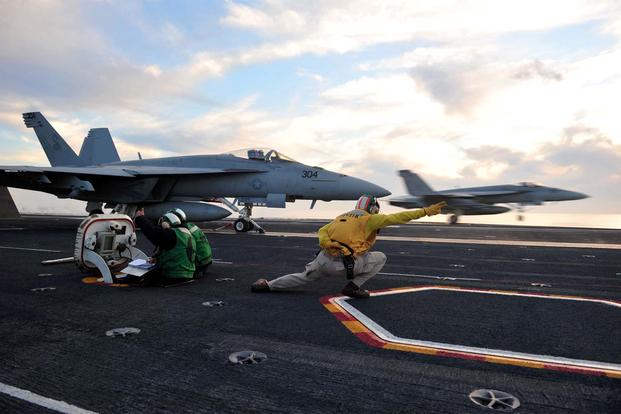Multiple Navy F/A-18 Hornets were dispatched from the carrier Ronald Reagan Sunday to escort Russian aircraft approaching the ship, Navy officials told Military.com on Wednesday.
Lt. Cmdr. Nicole Schwegman called the interaction between the U.S. and Russian planes "safe and professional." It took place more than 80 miles from the carrier, she said.
CNN first reported the interaction, which comes as military action intensifies in the Western Pacific amid North Korean threats. The news outlet reported that the Russian aircraft were Tupolev Tu-95 bombers, a propeller-driven aircraft that entered service for the Soviet Union in the 1950s.
The Reagan departed the South Korean port of Busan after a four-day port visit Oct. 26, and has been operating in the Sea of Japan. The carrier deployed from its homeport of Yokosuka, Japan, in May.
Related content:
- Navy: Failure of Leaders, Watchstanders Led to Deadly Ship Collisions
- Sailors Could Face Criminal Charges After Deadly Ship Crashes
- 'A Different Feeling': Navy Pilots Describe Shooting Down SU-22
It's not clear how many Hornets the carrier scrambled to intercept the Russian bombers.
However, U.S. and Russian aircraft have frequently interacted at close quarters without incident in recent months, even as political tensions persist between the two nations.
When Navy Hornet pilots described the June 18 shoot-down of a Syrian Su-22 Fitter over Syria in a September panel, they noted that that day, and on multiple other occasions, they had followed or escorted Russian aircraft operating safely and professionally in the region.
However, there have been exceptions.
In June 2016, a Russian Su-27 Flanker made a dangerously close pass at an Air Force RC-135, drawing protests from U.S. officials. And in February of this year, Russian aircraft buzzed the guided-missile destroyer Porter in an incident that U.S. officials attributed to "errors in judgment" on the part of the pilots.
-- Hope Hodge Seck can be reached at hope.seck@military.com. Follow her on Twitter at @HopeSeck.






























